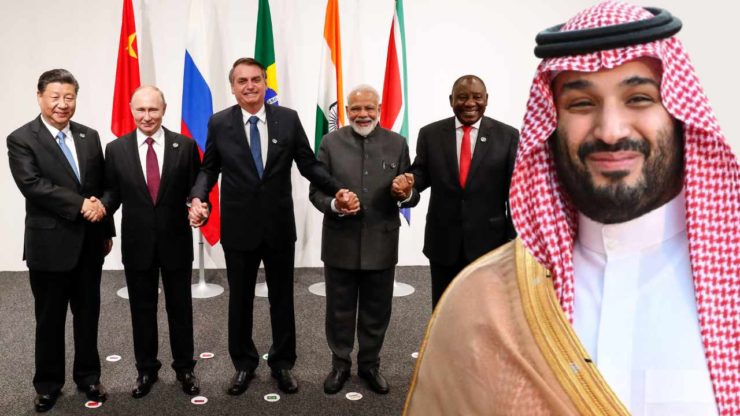
“The BRICS summit: what will the Arabs get?”. “The BRICS bloc and hopes for joint action,” “Arabs’ carte blanche in BRICS.” These and related headlines capture the various opinions expressed in the Middle East media and expert circles in response to the Johannesburg summit’s admission of new nations, including three Arab nations: Egypt, Saudi Arabia and the UAE.
Recently, the media has been overwhelmed by a surge of curiosity about the development and operations of this organization. Even in coffee shop talks, BRICS was brought up as though discussing televised talent shows or soccer championships. Public debate has called for the formation of a BRICS+ organization that is comparable to OPEC+.
Many observers in Egypt applaud their nation’s admission to BRICS. If used appropriately, it is good news for Egypt’s economy and other areas. They quote statistics showing that commerce between Egypt and the BRICS countries increased from $28.3 billion in 2021 to $31.2 billion this year. Trade between Egypt and Russia increased by 17.6%.
A Cairo-based magazine points out that since the BRICS nations produce a third of the world’s food, the Arab Republic of Egypt joining them will raise the likelihood that the issues with grain imports will be resolved. Benefits include the potential for increasing commerce and investment with the fastest-growing economies in the world.
The Emirati newspaper Al Khaleej points out that it may be too soon to predict how the BRICS would look in the future after the addition of new members. The first claimed objectives, however, are symptomatic. They are regarded as signals that encourage the movement of the world to a new orbit of cooperation, beyond the West’s logic of “you are either with us or against us.”
One of the UAE’s “priorities” to maintain balanced strategic and economic links with various parties is engagement with the BRICS group. The authors anticipate that BRICS will start to bolster its structures and increase its power.
The expansion of trade between the alliance’s current members, which increased by 56% between 2017 and 2022 to reach $422 billion, and the admission of nations like Saudi Arabia and the UAE to the group, which could give it new financial and strategic advantages in terms of liquidity, supply chains, etc., both support this message.
The Kingdom’s entry as a strategic energy reservoir elevates the group’s role as well as Riyadh’s image, says a Saudi professor. His colleague from the daily Asharq Al-Awsat highlights that the general populace is more government-oriented toward the BRICS. Not only because of the West’s increasingly destructive actions, but also because of the founding nations’, particularly China’s and Russia’s, adoption of a code of conduct.
Sixty years later, Africa is still plagued by poverty, division, and conflict. The continent is interested in the slogans that BRICS promotes, and Russian President Vladimir Putin wants to provide the continent with free grain and fertilizer. Meanwhile, China allocates billions for high-tech projects and transportation systems.
The Western perspective on the BRICS is another subject of discussion in the Middle East media community. On the one hand, they underline European and American authors’ attempts to mislead the public about the group’s true function, predicting its downfall and collapse. However, there are indications that Western nations are concerned about the organization’s operations.
The motives here are varied. The first, according to the Saudi analyst, is that BRICS has brought down the regime of sanctions imposed by the Western world against Moscow. Commerce between Moscow and the G7 has decreased by 36% since their implementation in 2014, while trade with the BRICS nations has increased by 121%. Therefore, this group’s position has an impact on the economy of the Russian Federation.
The second is the concern that the BRICS organization may morph into an unofficial G7 equivalent. At the moment, the G7 nations consult one another before international gatherings like the G20 summits. If the BRICS implements these actions, it will aid in representing the G20 group’s concerns as those of emerging nations.
The third concerns currency. So far, the BRICS New Development Bank is not a competitor of the World Bank. But in the future, the situation may change due to the presence of entities that are able to provide large funds for the realization of development projects for the benefit of peoples without imposing any political or social conditions.
Positive aspirations and expectations, however, do not guarantee that the numerous problems that these states are currently facing can be resolved overnight. It will require some time and effort.
However, the significant change is that, according to the Al Mustaqbal Research Center in Abu Dhabi, four of the six new member states are Arab-Islamic. This is consistent with the BRICS’s mission to build a more just and equitable world representing all world civilizations as well as their objectives. Western civilization is just one of them.
Yury Zinin, senior researcher at the Center for Middle Eastern and African Studies of the Moscow State Institute of International Relations (MGIMO) of the Ministry of Foreign Affairs, exclusively for the online magazine «New Eastern Outlook»